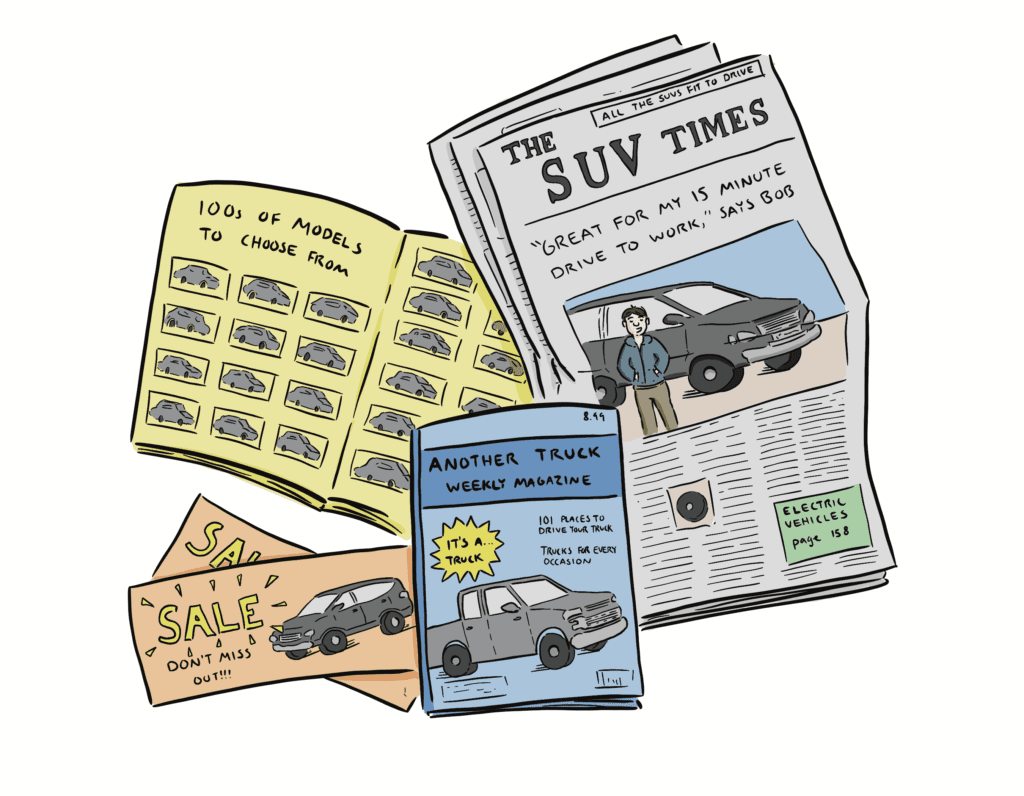Canada can significantly reduce transportation emissions by standing up to the auto industry and implementing new clean car regulations.
With gasoline prices so high, Canadians are increasingly feeling the pain at the pump. Many are considering making their next car purchase an Electric Vehicle (EV) to save money and cut their carbon footprint. But going electric isn’t easy – not only are EVs too expensive, they aren’t readily available to buy either.
Canada’s slow rate of EV adoption is not the fault of consumers. Despite 83 per cent of Canadians willing to test drive an electric car, and 51 per cent willing to buy one, a majority (55 per cent) of dealerships don’t have a single EV in stock. Wait times are also a problem, with 64 per cent of Canadian dealerships reporting wait times of three to six months for an electric car order, which has only gotten significantly worse since gas prices have gone up.
The blame for Canada’s slow rate of EV adoption can be laid at the feet of automakers. Big car corporations like to make lofty promises in public about their ambitions to make more EVs but lobby hard behind closed doors against regulations (like a Clean Car Standard) that would make them live up to their word.
Canada needs a Clean Car Standard to increase accessibility and affordability of EVs.
What is a Clean Car Standard?
A Clean Car Standard, (sometimes referred to as a zero-emission vehicle (ZEV) standard) is a regulation that sets clear targets for electric car adoption, and penalizes car companies that fail to shift their business plans towards an electric future.
Under this regulation, the government sets a target that specifies what percentage of car sales must be electric each year. The federal government has set sales targets of 20 per cent by 2026, 60 per cent by 2030 and 100 percent by 2035, but have yet to implement regulations to enforce this.
With regulations to enforce these targets, car companies would get one credit for each EV they sell, partial credits for plug-in hybrids sold – and would be required to reach a specific number of credits equal to the rising percentage of sales goals each year. At the end of the year, the car corporations that don’t hold enough credits will be fined for each one missing.
So what does this mean? Essentially, this regulation would gradually reduce and effectively ban the sale of gasoline powered cars by 2035.
Car corporations want to keep profiting from pollution
The auto industry has been hard at work lobbying against these new rules. The stakes are high – because there is a lot of money to be made at the expense of our climate if these regulations don’t come through.
Car corporations are opposed to this regulation because they make most of their money by selling gas-guzzling SUVs and trucks, which are about 20 per cent less fuel efficient than a regular passenger car. SUVs and trucks command a price premium, and have a significant manufacturing capacity attached to making them. They make up eight out of every ten car sold in Canada because car companies throw their weight behind pushing them onto consumers, dedicating nearly 80 per cent of their advertising to the task. All these big, fuel-inefficient vehicles are the reason why Canada has the most polluting car fleet in the world.


The longer that car companies can delay transitioning their business plans to making electric cars instead of gas guzzlers, the more money they can make. They’ll continue to rake in bigger profits thanks to higher margins on highly polluting cars, while avoiding the costs of investing in electric car and battery manufacturing capabilities. The reason why there are so few electric cars, why they cost so much to buy and why transportation emissions keep rising is that car corporations make more money that way.
Automakers have a vested interest in keeping this racket running.
Standing up to Car Corporations
A Clean Car Standard would force car companies to invest in electric car and battery manufacturing capacity, as well as research and development that would bring EV prices down. Instead of keeping electric cars as low-supply, high-priced luxuries out of reach to most people, they’d have to create manufacturing cost savings and sales price reductions associated with scaling up to higher volumes of production. They would even have to accept lower profit margins on each car sold by reducing their EV price mark-ups so they can sell the volume necessary to meet the targets. Instead of profiting from pollution, they would end up paying for it. A Clean Car Standard makes car corporations take responsibility for the damages their products cause to the climate by making them clean up their act.
It’s no coincidence that the two provinces with clean car standards – British Columbia (BC) and Quebec have some of the highest EV availability in Canada. Quebec for example, has four times the number of electric cars available to buy as Ontario, and BC has over five times the number of EVs available as neighbouring Alberta.
Driving Emissions Down
Hitting those EV adoption targets is critical to reaching our climate goals while delivering cleaner air and lower household transportation costs. By implementing strong Clean Car Standard regulations, Canada can make buying an affordable electric car much easier.
By pairing this regulation with a strategy to attract investment in electric car and battery manufacturing to Canada, we can create good, climate-friendly jobs and ensure no auto-worker is left behind in the transition. As the UK, Europe, California and 14 other US states are moving forward with banning gasoline cars by 2035 – Canada can’t be left in the dust. Transitioning too slowly and continuing to make gas guzzlers while the world leaves them behind puts jobs, and our future economic prosperity at risk. When Canada joins the growing list of jurisdictions with a Clean Car Standard in place, 43 per cent of the North American car market will be covered by it – creating a transformative market signal that will spur investments in supportive charging infrastructure.
It’s up to us to make it happen and to stop the government from dragging its feet in implementing this. Canada shouldn’t let the greed of the car industry stand between us and a sustainable future.








